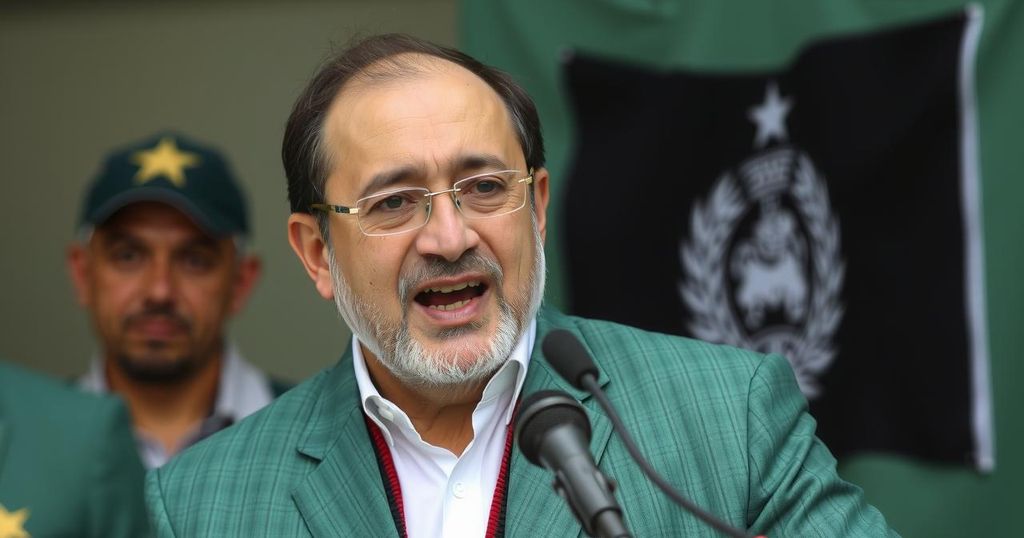South Africa’s Sports Minister Advocates Boycott of Afghanistan in Cricket

South Africa’s Sports Minister Gayton McKenzie supports a boycott of Afghanistan in cricket due to Taliban-imposed restrictions on women’s rights. His stance aligns with British politicians advocating for England to abstain from competing against Afghanistan. McKenzie encourages Cricket South Africa and the ICC to reconsider their fixtures with Afghanistan, regarding it as a stance for women in sports while emphasizing that he cannot unilaterally decide on the matter.
South Africa’s Sports Minister, Gayton McKenzie, has demonstrated his support for the movement advocating a boycott of Afghanistan in the forthcoming Champions Trophy. This stance aligns with similar calls made by British politicians, who urge England to refrain from facing Afghanistan next month. The proposed boycott stems from the Taliban’s ongoing suppression of women’s rights since their return to power in August 2021. McKenzie has urged Cricket South Africa (CSA) and other cricketing bodies, including the International Cricket Council (ICC), to reassess their commitment to compete against Afghanistan, emphasizing the message such actions convey to the global community, particularly concerning women in sports.
While McKenzie acknowledged the serious implications of his request, he stated it is not within his authority as Sports Minister to determine whether South Africa should participate in the scheduled matches against Afghanistan. He expressed a personal desire to withdraw from that fixture, citing parallels between his experiences during apartheid and the treatment of women in Afghanistan. He remarked, “As a man who comes from a race that was not allowed equal access to sporting opportunities during apartheid, it would be hypocritical and immoral to look the other way today when the same is being done toward women anywhere in the world.”
Internationally, figures such as Peter Hain, a former British cabinet minister and anti-apartheid activist, have written to CSA, advocating for a stand against the ban on women’s cricket in Afghanistan, echoing the sentiments of over 160 British politicians who signed a letter to the England and Wales Cricket Board (ECB) calling for a boycott. Furthermore, Cricket Australia had previously postponed a bilateral T20 series against Afghanistan in March due to concerns about deteriorating human rights in the country. However, they contested against Afghanistan at the ICC ODI World Cup and T20 World Cup in 2023, highlighting the ongoing debate within different cricketing nations regarding their engagement with Afghanistan.
The discussion concerning the potential boycott of Afghanistan by cricketing nations, particularly South Africa, is rooted in the Taliban’s treatment of women and girls since their resurgence to power in August 2021. The growing concern over human rights violations and the suppression of women’s rights has led to calls from international politicians and activists for cricket boards to consider their ongoing relations with Afghanistan in light of these critical ethical concerns. The complexities of international sports politics and human rights advocacy coincide in this context, prompting a reevaluation of traditional sporting norms and fixtures. Cricket Australia’s previous postponement of a bilateral series against Afghanistan further underlines the impact of these issues on competitive scheduling and relations between nations within the sport. The current climate reinforces the need for coherent responses and consistent actions from the international cricket community, as observed in the varying positions of nations like England and Australia regarding fixtures against Afghanistan.
In conclusion, South Africa’s Sports Minister Gayton McKenzie is advocating for a boycott of Afghanistan at the upcoming Champions Trophy, a stance that resonates with increasing international calls to support women’s rights. His personal reflections on equality highlight the importance of aligning sports with ethical stances against human rights violations. With support from international politicians and cricket boards, the conversation around Afghanistan’s participation in global cricketing events continues to intensify as nations weigh their options in both sports and human rights advocacy.
Original Source: www.newsbytesapp.com








